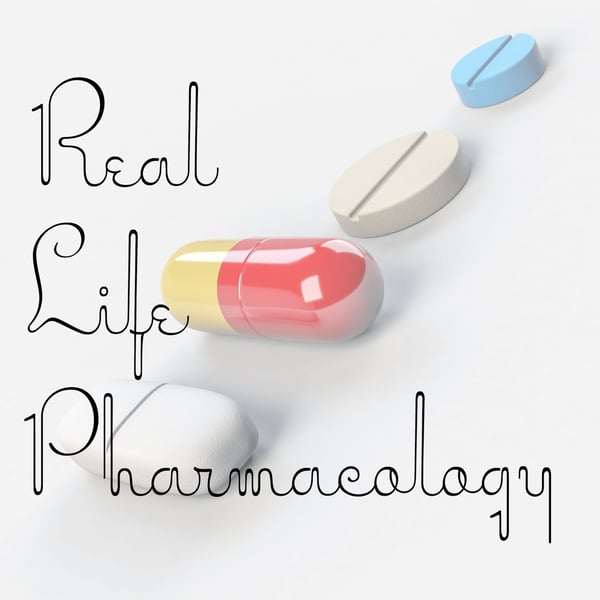Mirtazapine Pharmacology
Real Life Pharmacology - Pharmacology Education for Health Care Professionals
Eric Christianson, PharmD; Pharmacology Expert and Clinical Pharmacist
5 • 716 Ratings
🗓️ 4 October 2018
⏱️ 14 minutes
🧾️ Download transcript
Summary
We will review how mirtazapine works in the body and how those cause adverse effects and benefit out patient.
I will also look at the side effect profile and why mirtazapine may be harmful or helpful in our patients.
We cover drug interactions for mirtazapine in the podcast as well.
Mirtazapine is an antidepressant and I mention discontinuation syndrome as well as what I see as being done when converting a patient from one antidepressant to another.
Enjoy the show and don't for get to get your free gift by subscribing!
Transcript
Click on a timestamp to play from that location
| 0:00.0 | On this episode of the real-life pharmacology podcast, I'm going to cover mertazapine, |
| 0:08.1 | which the brand name is Remeron. |
| 0:11.2 | Now, this drug, how it works is it blocks alpha-2 receptors within the central nervous system, |
| 0:20.8 | or it's an antagonist. |
| 0:22.6 | And this can ultimately increase norapinephrine and serotonin release. |
| 0:29.6 | Now this mechanism is slightly different from serotonin re-uptake inhibitors and SNRIs like serotonin and norophenreupine reuptake inhibitors. |
| 0:41.6 | So it does work slightly differently. |
| 0:45.4 | One other thing with the mechanism that's unique, |
| 0:49.3 | and I'll talk a little bit about the side effects with the medication as well, but myrtazapine can block |
| 0:58.2 | H-1 receptors. So that means it has antihistamine activity and can give it some sedative type |
| 1:07.6 | properties, which I'll talk about a little bit more as I'm getting into the side effects. |
| 1:13.4 | Now, thinking about, you know, kind of how the drug works, what it's acting upon in the central |
| 1:20.5 | nervous system, we can probably theorize that this drug is going to be indicated for the use of depression, treating depression, |
| 1:30.5 | and certainly it is. With the adverse effect profile of sedation, this drug is often used for |
| 1:40.4 | insomnia as well. And because of that antihistamine effect, |
| 1:46.5 | we may also see some weight gain. |
| 1:50.1 | Now, that can definitely be problematic in some patients, |
| 1:54.1 | let's say type 2 diabetic who's overweight already, |
| 1:58.5 | or, you know, younger females and males that have been gaining weight, |
| 2:03.0 | you know, that's a big problem, a potential adverse effect that's significant. |
| 2:08.7 | In our geriatric patient population, if we have trouble with patients who are anorexic, |
| 2:15.3 | they have trouble eating, really have poor appetite, |
... |
Please login to see the full transcript.
Disclaimer: The podcast and artwork embedded on this page are from Eric Christianson, PharmD; Pharmacology Expert and Clinical Pharmacist, and are the property of its owner and not affiliated with or endorsed by Tapesearch.
Generated transcripts are the property of Eric Christianson, PharmD; Pharmacology Expert and Clinical Pharmacist and are distributed freely under the Fair Use doctrine. Transcripts generated by Tapesearch are not guaranteed to be accurate.
Copyright © Tapesearch 2025.

